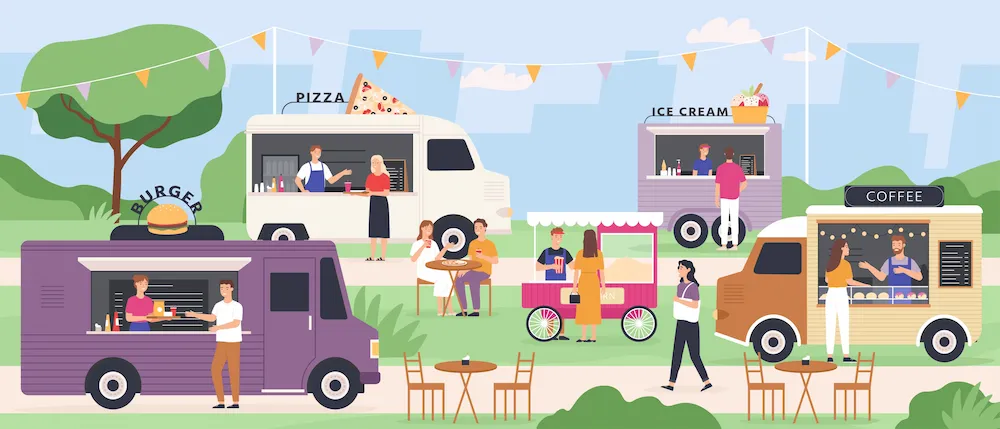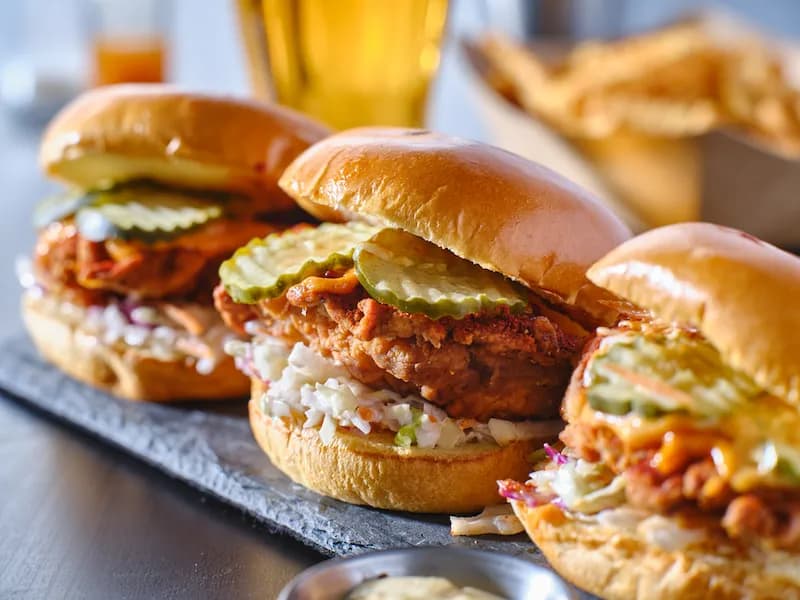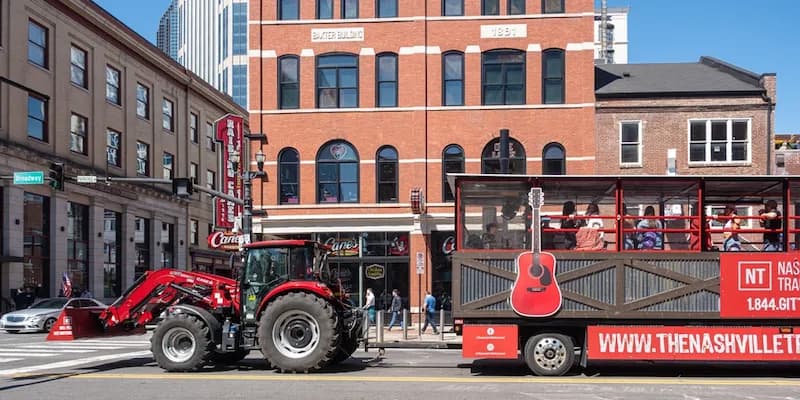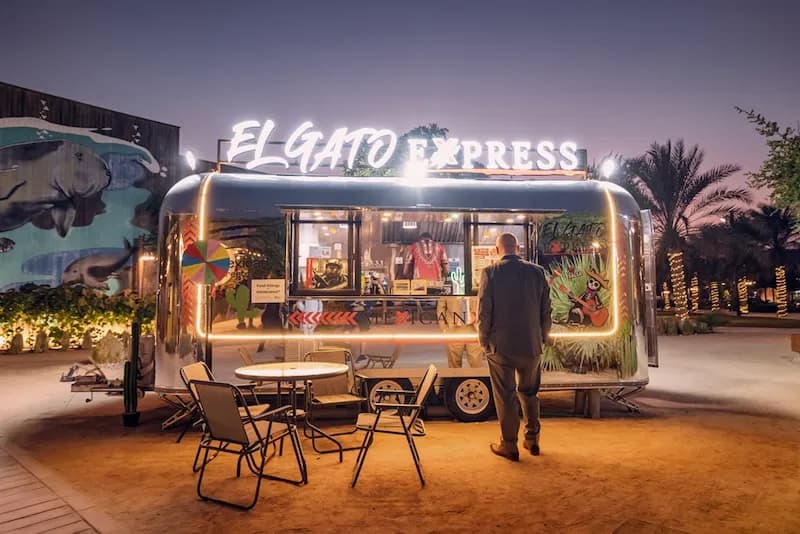What You Need to Know to Start a Food Truck in Nashville TN
A step-by-step guide on how to start a food truck in Nashville TN. Covers licenses, setup, staffing, parking rules, vendor zones, and key startup tips.
Tauseeq Magsi
loading...

Nashville, TN is known for its vibrant music scene, delicious food, and friendly people.
Is Nashville a good market for food trucks?
Nashville Food Trucks Launch Checklist: From Business Plan To First Sale
Step 1: Plan Your Food Truck Vision and Get the Basics in Place
Step 2: Establish Taxes and Select Your Business Structure
Step 3: Get Your Permits & Licenses in Place
Permit & License Timeline Summary
Step 4: Find and Secure Your Food Truck
Step 5: Arrange Commissary Access and Manage Waste Properly
What Else Do You Need to Know to Run Your Food Trucks Nashville Smoothly?
Starting a food truck in Nashville, Tennessee, needs more than simply an excellent dish.
You'll need permits, a suitable truck, an effective parking strategy, and a thorough awareness of local restrictions.
This guide lays down each step so you know what to do next.
Many people search for food trucks for sale Nashville or want help finding the right location, but they're often missing important details like how to apply for licenses, how long the setup takes, and what the real costs look like.
That’s why this guide covers everything from paperwork and legal requirements to buying a truck and getting your first sale.
If you're ready to join the busy world of food trucks in Nashville and want your business to be legal, reliable, and ready to serve, this article gives you a step-by-step plan that’s built for the Nashville market.
Let’s get started!

Nashville is alive with a bustling food scene, making it a prime location for food trucks.
Is Nashville a good market for food trucks? (top)
Yes, it is — and it's growing fast.
Nashville has a strong food truck scene thanks to its steady tourism, busy downtown, and year-round events and festivals.
The city's vibrant music and arts culture draws both locals and visitors who love trying new foods from food trucks. There are also special zones in Metro parks where food trucks are allowed to operate with permits, which makes it easier to find good spots to set up.
Nashville ranks 10th among the top 20 food truck cities. This ranking considers how easy it is to get permits, follow rules, and operate the truck.
Nashville’s operating costs are about average, and working with city officials is generally smooth.
That said, there are a few things to watch out for.
The city has zoning rules that limit where and when you can park, like staying at least one block away from schools during school hours.
It can also be competitive to get permits for high-traffic areas, and there are only so many public spots available.
Still, with the right planning and a solid setup, food trucks Nashville can do really well.

A female customer shows her Nashville hot chicken sandwich from a food truck in Nashville, Tennessee.
Nashville Food Trucks Launch Checklist: From Business Plan To First Sale (top)
If you're ready to launch your own food truck in Nashville, there's a clear process you'll need to follow to do it right.
From getting permits and buying the truck to knowing where you can park and how to handle waste, each step matters.
You can use this checklist to make sure you do everything you need to get your food trucks in Nashville business up and running.
Step 1: Plan Your Food Truck Vision and Get the Basics in Place (top)
Create a strong business strategy before launching your food truck in Nashville.
This includes outlining your food concept, choosing your target areas (like downtown, parks, or local events), and figuring out how you plan to make money.
Think about your pricing strategy, what your busiest days might look like, and how much volume you expect to handle.
You’ll also want to estimate your startup costs and plan your budget carefully.
Include things like truck purchase or rental, equipment, permits, marketing, and daily operations. Take time to map out a basic 6–month sales forecast and set a goal for when you expect to break even.
This preliminary preparation keeps you on track and gets you ready for future funds or permits.
This phase takes most individuals two to four weeks, depending on how much preparation and research they have previously done.

Nashville enforces zoning rules that limit where and when food trucks can park, like staying at least one block away from schools during school hours.
Step 2: Establish Taxes and Select Your Business Structure (top)
You must choose a business structure when you first launch your food truck company.
Typical choices consist of:
✅ Sole Proprietor: The simplest form, where you and the business are the same legally.
✅ Limited Liability Company (LLC): A separate legal entity that protects your personal assets.
✅ C-Corporation: A more complex structure, taxed separately from its owners.
To set up, file your chosen business structure with the Tennessee Secretary of State, get an Employeer Identification Number (EIN) from the IRS, and register with the Tennessee Department of Revenue.
Consulting an accountant is recommended to handle taxes and compliance.
This usually takes 1 to 3 weeks.

Request an Employer Identification Number (EIN) from the IRS.
Step 3: Get Your Permits & Licenses in Place (top)
To proceed with your plan for starting a food truck in Nashville, TN, you must obtain the necessary permissions and licenses from the city and the state.
Register with the Tennessee Department of Revenue and obtain your business license
Apply for a Mobile Food Unit Permit
Obtain Food Handler / Food Protection Manager Certification
This phase is essential to ensuring that your company is completely compliant with the law and prepared to run smoothly.
This is a list of the things you need and where to find them.
a. Register with the Tennessee Department of Revenue and obtain your business license. (top)
Start by applying for a municipal license to run your food truck at the Metro Nashville Business License Division.
You'll also register with the Tennessee Department of Revenue via TNTAPfor state sales tax.
You'll need your EIN from the IRS and your chosen business structure details. This ensures you're legal to sell food and collect taxes.
b. Apply for a Mobile Food Unit Permit (top)
You must get a Mobile Food Vendor Permit from Nashville’s NDOTto sell in public areas like the Downtown Core.
Apply online through the Metro Public Health ePermits portal.
You’ll need to submit your menu, photos of your truck, a commissary agreement, fire and health inspection approvals, a wastewater disposal plan, and your driver’s license.
The permit fee is $55 every two months and must be displayed on your truck.
Vendors must follow rules about where and when they can park, including staying away from restaurants and schools without permission
c. Obtain Food Handler / Food Protection Manager Certification (top)
Every team member handling food must complete a Tennessee-approved food safety course. Costs are capped around $15per person, and managers often need a higher-level Manager’s certificate.
d. Get a Fire Safety Permit (top)
Any truck cooking with propane, grills, or fryers must pass a fire inspection and obtain an annual fire safety permit from the State Fire Marshal's Office.
The permit costs around $300.
e. Secure Public Health & Seller’s Permits (top)
A Metro Public Health permit comes with your mobile unit application. Separately, register for a Tennessee seller’s permit online via TNTAP.
There’s no application fee, though a tax deposit may be required in some cases.
f. Obtain a Metro Parks Vendor Permit (if operating in parks) (top)
To vend inside city parks, apply through Metro Parks & Recreation.
You'll need a current business license, fire and health approvals, a photo of your truck, your menu, and $1 million in liability insurance naming Metro Parks as an additional insured.
Fees vary by park.

Nashville requires food truck operators to have a variety of permits and licenses, including a mobile food unit permit. Do not begin operating your food truck until you have obtained all necessary permits and licenses.
Permit & License Timeline Summary (top)
Total estimated time to complete all steps: 4 to 10 weeks, depending on how quickly inspections and paperwork are processed.
| Task | Estimated Time |
|---|---|
| Business license & Tennessee registration | 1–2 weeks |
| Mobile food unit permit | 4–8 weeks |
| Food safety certification | 1–2 days |
| Fire safety permit | 2–4 weeks |
| Public health and seller’s permit | Included in mobile permit timeline |
| Metro Parks permit (if applicable) | 2–4 weeks (varies) |
Step 4: Find and Secure Your Food Truck (top)
Choosing the right truck is a key part of starting your food truck business.
When looking for a food truck for sale Nashville or food trucks for sale Nashville, you have options like used trucks—common models include Ford and Chevy step vans already fitted with kitchens.
You can also consider new trailers, such as specialized food trailers that offer flexibility and customization for your menu needs.
Local marketplaces like Mobile Food Alliance often list available trucks and trailers in Tennessee, making it easier to find options nearby.
Take your time to explore different trucks or trailers and decide which fits your business model and operational needs best.
Your choice here will shape the day-to-day running of your food trucks Nashville business.

Since the cost of a food truck can be high, consider starting with a food trailer or a used food truck to reduce initial expenses.
Step 5: Arrange Commissary Access and Manage Waste Properly (top)
Greywater disposal, food preparation, and storage all need the use of a licensed commissary.
Your food truck has to dispose of garbage at a facility that complies with Metro Nashville and Fire Department standards.
This ensures that you continue to follow safety and health laws.
For detailed rules and approved commissaries, refer to the Nashville Department of Health and NDOT guidelines.
What Else Do You Need to Know to Run Your Food Trucks Nashville Smoothly? (top)
Starting your food truck in Nashville is just the beginning.
Once you have your truck and permits ready, there are a few more practical details to handle that will keep your business running day-to-day.
Here's what else you should think about as you prepare to take the streets.
🔥 You Need The Right Crew And Proper Food Handling Certification.
Running a food truck smoothly requires having enough personnel to manage the workload.
Plan for at least two crew members: one to cook and one to manage orders, payments, and customer service.
During busy events or peak hours, consider adding extra staff to keep lines moving and maintain service quality.
Every staff member who handles food must hold a valid food handler’s license issued by the state of Tennessee.
This certification ensures your team follows safety standards and keeps your business compliant with health regulations.

Be sure your Nashville food truck has the right size crew to handle the demands of your menu and service style.
🔥 You Must Set Up Reliable Electricity and Water Systems
Your food truck will need a dependable power source and water supply.
Most trucks come with onboard diesel generators (around 5 kW), which provide electricity for cooking equipment and lights while on the move.
When parked at events or your commissary, you may be able to hook up directly to external power sources, saving fuel and noise.
For water, trucks are equipped with freshwater tanks for cooking and cleaning, along with greywater tanks to hold wastewater.
Follow Metro Nashville’s disposal guidelines carefully—dumping wastewater improperly can lead to fines or permit issues.
Planning how to manage power and water is essential for smooth daily operations.
🔥 You Should Know Where to Park to Maximize Sales
Where you park your food truck has a big impact on your success.
Nashville has designated vendor zones —especially in the Downtown Core, where food trucks can legally operate.
You can use the city’s official vendor zone map to find available spots.
Just keep in mind that there are specific rules: you must maintain a 6-foot clear path for pedestrians, stay at least one block away from schools during school hours, and avoid locations too close to restaurants, hydrants, intersections, or exits unless you have written permission.
Parking in alleys is not allowed.
For private events, you’ll usually work out parking with the organizer. If you’re aiming to sell at parks or festivals, you’ll need special permits from Metro Parks.
Additionally, many food truck owners use apps, websites, and community boards to discover new sales locations and connect with event planners.

Aside from having to following Nashville's zoning laws, food truck operators will also have to share the streets with the many tourist-centric vehicles that frequent the area.
🔥 Adding Seating Can Boost Customer Comfort but Requires Extra Planning
Some food trucks include tiny, folding tables and chairs to create a more comfortable environment for customers to dine and relax.
This additional seating can encourage customers to linger longer, thereby increasing sales.
However, it takes more storage space on your vehicle and may necessitate additional permissions or clearances from local authorities.
Consider the size of your truck and your typical sales locations before deciding to provide seating.
Offering seating is a great way to improve the customer experience if you can manage the logistics.

Although not strictly necessary, offering seating can significantly enhance the customer experience for your food truck business.
🔥 You Need a Solid Waste Management Plan to Stay Compliant
One of the key elements of operating a food truck is handling waste and rubbish.
Garbage, grease, and food waste must be regularly disposed of; this is usually done by your commissary or a certified trash agency.
To safeguard the environment and public health, Nashville mandates that food trucks adhere to stringent guidelines regarding the location and manner of garbage disposal.
Improper garbage management might result in penalties or possibly permit suspension.
Planning this ahead ensures your operation runs smoothly without unexpected interruptions.

The devil is in the details, but with careful planning and execution, you can set your food truck up for success in Nashville.
Final Things to Check Before You Launch (top)
Before you officially hit the streets, take a little time to double-check the details that matter.
Review local zoning rules — especially near schools, hospitals, and residential areas — to make sure your locations are fully compliant.
Do a few test runs to check your setup, water flow, staff coordination, and how your truck handles roadside conditions like narrow turns or limited parking.
It also helps to join local Nashville food truck groups or online communities.
You can learn from others, get tips on good locations, and stay updated on regulations.
By now, you should have a clear picture of how to start a food truck business in Nashville, TN —from permits and planning to setup and daily operations.
Once your paperwork is approved, your crew is ready, and your truck is stocked, you’ll be all set to roll out a fully legal and well-prepared Nashville food truck business.
Good luck bringing your food truck dream to life in beautiful Nashville!

We ❤️ Nashville!
©2025 Cocina Digital Hospitality Group, Inc. All rights reserved.
No part of this publication may be reproduced, stored in a retrieval system, or transmitted in any form or by any means, electronic, mechanical, photocopying, recording, or otherwise, without the prior written permission of the publisher.
We use cookies to enable you to use our site, understand how you use our site, and improve your overall experience.
Cookies allow us to personalize content, track which pages are most popular and least popular, and provide advertising that may be relevant to you.
Please note that cookies that are essential to the proper functioning of the site are required and cannot be disabled.
They are usually only set in response to actions made by you which amount to remembering your settings, a request for services, such as setting your privacy preferences, logging in, or filling in forms.
As such, they are the only cookies that are enabled by default.
You can set your browser to block or alert you about these cookies.
By continuing to use our site, you accept our use of cookies.